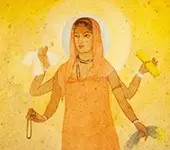The Greatness of Hindu Family Life

Hindu family life, deeply rooted in ancient traditions and spiritual wisdom, offers a profound model of social harmony, mutual respect, and moral responsibility. Far from being a relic of the past, its principles continue to sustain generations, blending duty, devotion, and a sacred view of human relationships. Here, we explore the pillars that make Hindu family life a remarkable institution.
1. Dharma: The Moral Compass of Family Duty
At the heart of Hindu family life lies dharma - the ethical obligation to uphold societal and cosmic order. Central to this is the duty to perpetuate the family lineage. As articulated in the Laws of Manu, a son is seen not merely as a personal desire but as a fulfillment of a moral debt to ancestors and society. The son, entrusted with performing rites for departed souls, embodies this responsibility.
2. Marriage: A Sacrament of Divine Unity
Hindu marriage transcends mere companionship; it is a sacred union where husband and wife complement each other as equals.As Manu puts it: The man is not the man alone; he is the man, the woman and the progeny. The sages have declared that the husband and wife are one unit The Vishnu Purana poetically illustrates this synergy:
He is Vishnu; she is Lakshmi. She is language; he is thought. She is prudence; he is law. He is reason; she is sense. He is will; she is wish. He is music; she is lyrics. He is flag-staff; she is flag. He is strength; she is beauty. He is ocean; she is shore. She is duty; he is right. He is patience; she is peace. He is will, and she is wish. He is fuel; she is fire. He is lamp; she is light. He is soul; she is body.
3. The Joint Family: A Collective Embrace
The joint-family system, where multiple generations coexist under one roof, exemplifies collective living. Uncles, aunts, and cousins are regarded as immediate family, with elders cared for as lovingly as children. This structure nurtures interdependence, ensuring no one faces life’s challenges alone. While critics may highlight occasional tensions, the system’s strengths—shared responsibilities, emotional support, and the preservation of cultural values—far outweigh its flaws.
4. Women: The Soul of the Household
Contrary to stereotypes of subjugation, Hindu women hold a revered position. The Laws of Manu declare:
"The mother exceeds a thousand fathers in the right to reverence."
Wives are honored as "Devi" (goddess), and their role as homemakers is celebrated as noble and dignified. While Western critiques often equate independence with economic activity, Hindu philosophy elevates women’s influence within the home. Contrary to claims of tyranny by mothers-in-law, affection and mutual respect often define these relationships.
5. Spirituality Over Ritual: A Deeper Understanding
A ritual is associated with every family event. These are ‘laboratories’ where higher spiritual truths are learned through ‘practicals’. For example,by understanding the death rites, one becomes convinced about the immortality of the soul.
Hindu family life thrives on a delicate balance - between individual duty and collective welfare, tradition and adaptability, reverence and practicality. Its greatness lies not in perfection but in its ability to weave spiritual ideals into everyday existence. In a world increasingly fragmented by individualism, the Hindu ethos of "family as the fundamental unit" offers timeless lessons in unity, resilience, and the sacredness of human bonds. Families may not be perfect yet they are full of love, striving to honor their heritage while nurturing the future.

English
Bharat Matha
Click on any topic to open
- 44 The Greatness of Hindu Family Life
- 43 Ethical Warfare in Ancient Hindu Tradition
- 42 Agnikula: The Fire Lineage of Rajputs
- 41 Longevity of Our Ancients
- 40 Brahmacharya Stage of Life in Ancient Bharat
- 39 Alwar City and Mahabharata
- 38 Zoroastrianism: An Offshoot of the Vedic Religion
- 37 Origin of the Terms, Hindu and Hindustan
- 36 Vedic and Zoroastrian Religions: A Role Reversal
- 35 Harappa was Hariyupiya: Rigveda Refutes Aryan Migration Theory
- 34 Descendants of Lord Rama and Yudhishthira: Royal Legacies in History
- 33 The Revolutionary Legacy of Abhinav Bharat: A Comprehensive Look
- 32 Geography in Mahabharata
- 31 Seven Ancient Kingdoms to the West of Sindhu
- 30 Guru Ram Singh - A Hero Of Indian Freedom Movement
- 29 Bharata Varsha = Indian Peninsula + Eight Islands. Which Are They?
- 28 The Puranic Geography Of Bharata Varsha
- 27 Many Rishis Consider Indra and Varuna as Equals
- 26 Devasura Battle At Balkh
- 25 Vrishakapi the Asura Chief
- 24 The History of Alcohol
- 23 Founding of the Asura Religion
- 22 Bharata Varsha Gets Divided Into Two Parts
- 21 How Siberia Lost Its Status as Swarga on Earth
- 20 How Did Bharata Varsha Get Its Name?
- 19 We Should Build Temples for Bharat Mata and Worship Her
- 18 There Is Brahmaloka and Vishnuloka on the Surface of Earth Also
- 17 There Is Agniloka, Vayuloka, and Indraloka on the Surface of Earth Also
- 16 What Is the Role of Religion in a Secular Nation?
- 15 Lesser Known Facts About Jhansi Rani - Part 3
- 14 Lesser Known Facts About Jhansi Rani - Part 2
- 13 Lesser Known Facts About Jhansi Rani - Part 1
- 12 The Childhood of Sardar Patel
- 11 What Exactly is Jamboo Dwipa?
- 10 Actions in Bharata Varsha Alone Earn Punya and Papa
- 9 How Pilgrimages Held Bharata Together as a Single Nation
- 8 Rigveda on Seven Punya Nadis of Hindustan
- 7 How Rivers Helped in Keeping India as a Single Unit
- 6 Natural Abundance Shaped India's Thought Process
- 5 Importance of Prayag
- 4 Revisiting Education through the Lens of Sanatana Dharma
- 3 God Is Love, Said Tamil Saint Thirumular
- 2 Why All Avataras Happened in India Only?
- 1 Our Culture Is Strong Because It Is Based On Eternal Truth
7
30
Astrology
Atharva Sheersha
Bhagavad Gita
Bhagavatam
Bharat Matha
Devi
Devi Mahatmyam
Ganapathy
Glory of Venkatesha
Hanuman
Kathopanishad
Mahabharatam
Mantra Shastra
Mystique
Practical Wisdom
Purana Stories
Radhe Radhe
Ramayana
Rare Topics
Rituals
Rudram Explained
Sages and Saints
Shiva
Spiritual books
Sri Suktam
Story of Sri Yantra
Temples
Vedas
Vishnu Sahasranama
Yoga Vasishta